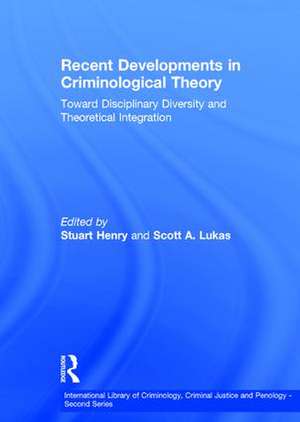Recent Developments in Criminological Theory: Toward Disciplinary Diversity and Theoretical Integration: International Library of Criminology, Criminal Justice and Penology - Second Series
Autor Scott A. Lukas Editat de Stuart Henryen Limba Engleză Hardback – 18 iun 2009
Din seria International Library of Criminology, Criminal Justice and Penology - Second Series
- 26%
 Preț: 1832.54 lei
Preț: 1832.54 lei - 25%
 Preț: 997.68 lei
Preț: 997.68 lei - 26%
 Preț: 1830.35 lei
Preț: 1830.35 lei -
 Preț: 414.36 lei
Preț: 414.36 lei - 25%
 Preț: 1107.09 lei
Preț: 1107.09 lei - 24%
 Preț: 1135.95 lei
Preț: 1135.95 lei - 26%
 Preț: 1634.02 lei
Preț: 1634.02 lei - 26%
 Preț: 1635.96 lei
Preț: 1635.96 lei - 26%
 Preț: 1819.09 lei
Preț: 1819.09 lei - 25%
 Preț: 939.94 lei
Preț: 939.94 lei - 26%
 Preț: 1832.12 lei
Preț: 1832.12 lei - 25%
 Preț: 1724.07 lei
Preț: 1724.07 lei - 26%
 Preț: 1695.20 lei
Preț: 1695.20 lei - 25%
 Preț: 995.15 lei
Preț: 995.15 lei - 19%
 Preț: 468.02 lei
Preț: 468.02 lei - 26%
 Preț: 1640.85 lei
Preț: 1640.85 lei
Preț: 1695.20 lei
Preț vechi: 2279.72 lei
-26% Nou
Puncte Express: 2543
Preț estimativ în valută:
324.53€ • 337.33$ • 269.07£
324.53€ • 337.33$ • 269.07£
Comandă specială
Livrare economică 16-30 ianuarie 25
Doresc să fiu notificat când acest titlu va fi disponibil:
Se trimite...
Preluare comenzi: 021 569.72.76
Specificații
ISBN-13: 9780754624691
ISBN-10: 0754624692
Pagini: 560
Dimensiuni: 169 x 244 x 37 mm
Greutate: 1.29 kg
Ediția:1
Editura: Taylor & Francis
Colecția Routledge
Seria International Library of Criminology, Criminal Justice and Penology - Second Series
Locul publicării:Oxford, United Kingdom
ISBN-10: 0754624692
Pagini: 560
Dimensiuni: 169 x 244 x 37 mm
Greutate: 1.29 kg
Ediția:1
Editura: Taylor & Francis
Colecția Routledge
Seria International Library of Criminology, Criminal Justice and Penology - Second Series
Locul publicării:Oxford, United Kingdom
Cuprins
Contents: Introduction; Part I Classical and Rational Choice Theories: Rational choice, deterrence, and theoretical integration, David A. Ward, Mark C. Stafford and Louis N. Gray; A crying shame: the over-rationalized conception of man in the rational choice perspective, Willem de Haan and Jaco Vos. Part II Biological and Biosocial Theories: A theory explaining biological correlates of criminality, Lee Ellis; Behavior genetics and anomie/strain theory, Anthony Walsh. Part III Psychological Theories: An alternative psychology of criminal behavior, Julie Horney; A sociocognitive analysis of substance abuse: an agentic perspective, Albert Bandura. Part IV Social Learning and Neutralization Theories: Moral disengagement in the perpetration of inhumanities, Albert Bandura; When being good is bad: an expansion of neutralization theory, Volkan Topalli. Part V Social Control Theories: In defense of self-control, Travis Hirschi and Michael R. Gottfredson; Refining control balance theory, Charles R. Tittle. Part VI Social Ecology, Subcultural and Cultural Theories: Transcending tradition: new directions in community research, Chicago style, Robert J. Sampson; New directions in social disorganization theory, Charis E. Kubrin and Ronald Weitzer. Part VII Anomie and Strain Theories: Anomie, social change and crime, Jon Gunnar Bernburg; Building on the foundation of general strain theory: specifying the types of strain most likely to lead to crime and delinquency, Robert Agnew. Part VIII Conflict and Radical Theories: Revisionist history, visionary criminology, and needs-based justice, Gregg Barak; The state of the criminology of crimes of the state, Dawn L. Rothe and David O. Friedrichs. Part IX Feminist and Gender Theories: Patriarchy, crime, and justice: feminist criminology in an era of backlash, Meda Chesney-Lind; Feminist state theory: applications to jurisprudence, criminology, and the welfare state, Lynne A Haney. Part X Critical Criminologies: Anarchist, Postmodernist, Peacemaking: Constitutive criminology: origins, core concepts, and evaluation, Stuart Henry and Dragan Milovanovic; Against the law: anarchist criminology, Jeff Ferrell; Restorative justice: what is it and does it work?, Carrie Menkel-Meadow. Part XI Conclusion: Interdisciplinary integration: building criminology by stealing from our friends, D. Wayne Osgood; Name Index.
Notă biografică
Stuart Henry, Professor, Director of the School of Public Administration & Urban Studies, San Diego State University, USA and Scott A. Lukas, Professor of Anthropology & Sociology, Lake Tahoe Community College, USA.
Descriere
This book contains recent cutting-edge articles from leading criminological theorists. The contributors focus on theory rather than empirical research and describe the new theoretical directions of their respective approaches and how they envision the future development of their theories. Taken together the articles represent different multi-disciplinary perspectives and present a cross-section of contemporary criminological theory.
